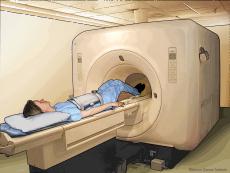 |
 |
 |
Other Health Topics:

-
Related Topics
-
Go Local
- Services and providers for MRI Scans in the U.S.
-
Languages
- Chinese - Simplified (简体中文)
- Chinese - Traditional (繁體中文)
- French (français)
- Hindi (हिन्दी)
- Japanese (日本語)
- Korean (한국어)
- Russian (Русский)
- Somali (af Soomaali)
- Spanish (español)
- Ukrainian (Українська)
MRI Scans
Also called: Magnetic resonance imaging, NMR, Nuclear magnetic resonance
Magnetic resonance imaging (MRI) uses a large magnet and radio waves to look at organs and structures inside your body. Health care professionals use MRI scans to diagnose a variety of conditions, from torn ligaments to tumors. MRIs are very useful for examining the brain and spinal cord.
During the scan, you lie on a table that slides inside a tunnel-shaped machine. Doing the scan can take a long time, and you must stay still. The scan is painless. The MRI machine makes a lot of noise. The technician may offer you earplugs.
Before you get a scan, tell your doctor if you
- Are pregnant
- Have pieces of metal in your body. You might have metal in your body if you have a shrapnel or bullet injury or if you are a welder
- Have electronic devices in your body, such as a cardiac pacemaker
Start Here
-
MRI
 (Patient Education Institute) - Requires Flash Player
(Patient Education Institute) - Requires Flash Player
Also available in Spanish
- MRI: Viewing Your Brain and Other Soft Tissues(Mayo Foundation for Medical Education and Research)
| Basics | Learn More | Multimedia & Cool Tools |
|---|---|---|
| Research | Reference Shelf | For You |
-
Overviews
- Magnetic Resonance Imaging(International Society for Magnetic Resonance in Medicine)
-
Radiology in Motion: Magnetic Resonance Imaging
 (American College of Radiology, Radiological Society of North America) - Requires Flash Player
(American College of Radiology, Radiological Society of North America) - Requires Flash Player
-
Latest News
- 3-D MRI Helps Detect Patients at High Risk for Stroke(09/16/2008, HealthDay)
- MRI Detects Soft Tissue Damage Affecting Kids' Hearing(09/16/2008, HealthDay)
- MRIs Don't Improve Breast Cancer Care, Outcome(09/07/2008, HealthDay)
- More News on MRI Scans
-
Specific Conditions
-
Cardiac MRI
 (National Heart, Lung, and Blood Institute)
(National Heart, Lung, and Blood Institute)
-
Cardiac MRI (MRI of the Heart, Great Vessels and Adjacent Structures)(American College of Radiology, Radiological Society of North America)
Also available in Spanish
-
Chest MRI
 (National Heart, Lung, and Blood Institute)
(National Heart, Lung, and Blood Institute)
-
Functional MR Imaging (fMRI): Brain(American College of Radiology, Radiological Society of North America)
Also available in Spanish
-
MR Angiography (MRA)(American College of Radiology, Radiological Society of North America)
Also available in Spanish
-
MRI of the Body (Chest, Abdomen, Pelvis)(American College of Radiology, Radiological Society of North America)
Also available in Spanish
-
MRI of the Chest(American College of Radiology, Radiological Society of North America)
Also available in Spanish
-
MRI of the Head(American College of Radiology, Radiological Society of North America)
Also available in Spanish
-
MRI of the Musculoskeletal System(American College of Radiology, Radiological Society of North America)
Also available in Spanish
-
MRI of the Prostate(American College of Radiology, Radiological Society of North America)
Also available in Spanish
-
MRI of the Spine(American College of Radiology, Radiological Society of North America)
Also available in Spanish
-
Cardiac MRI
-
Related Issues
- Important Questions to Ask about the Quality of Your Imaging Examination(American College of Radiology)
-
Magnetic Resonance Imaging (MRI) Safety(American College of Radiology, Radiological Society of North America)
Also available in Spanish
- Questions and Answers on Gadolinium-Based Contrast Agents(Center for Drug Evaluation and Research)
- Tutorials Return to top
-
Games
- Play the MRI Game(Nobel Foundation) - Requires Flash Player
-
Clinical Trials
-
ClinicalTrials.gov: Magnetic Resonance Imaging
 (National Institutes of Health)
(National Institutes of Health)
-
ClinicalTrials.gov: Magnetic Resonance Imaging
-
Research
-
Neurological Imaging
 (National Institutes of Health) - Links to PDF
(National Institutes of Health) - Links to PDF
-
Neurological Imaging
-
Journal Articles
References and abstracts from MEDLINE/PubMed (National Library of Medicine)
- Article: Evaluation of MRI findings after polyacrylamide gel injection for breast...
- Article: Radiologic features of polyacrylamide gel mammoplasty.
- Article: Semiquantitative assessment of MR imaging in prediction of efficacy of...
- MRI Scans -- see more articles
- Medical Encyclopedia Return to top
-
Dictionaries/Glossaries
-
RadiologyInfo: Glossary of Terms(American College of Radiology, Radiological Society of North America)
Also available in Spanish
-
RadiologyInfo: Glossary of Terms(American College of Radiology, Radiological Society of North America)
-
Directories
- American College of Radiology Accredited Facility Search(American College of Radiology)
-
Organizations
- Center for Devices and Radiological Health
- RadiologyInfo(American College of Radiology, Radiological Society of North America)
-
Children
-
Keeping Kids Still during Exams(American Society of Radiologic Technologists)
Also available in Spanish
-
Keeping Kids Still during Exams(American Society of Radiologic Technologists)
| Home | Health Topics | Drugs & Supplements | Encyclopedia | Dictionary | News | Directories | Other Resources | |
| Disclaimers | Copyright | Privacy | Accessibility | Quality Guidelines U.S. National Library of Medicine, 8600 Rockville Pike, Bethesda, MD 20894 National Institutes of Health | Department of Health & Human Services |
Date last updated: 17 September 2008 Topic last reviewed: 02 July 2008 |






